Germans, Japanese and Marylanders Are Poisoned by the U.S. Military
Germans, Japanese and Marylanders Are Poisoned by the U.S. Military
Fire-fighting foams used on bases worldwide are contaminating the environment and endangering public health.
by Pat Elder, Military Poisons
sourced from Global Research
September 9, 2021
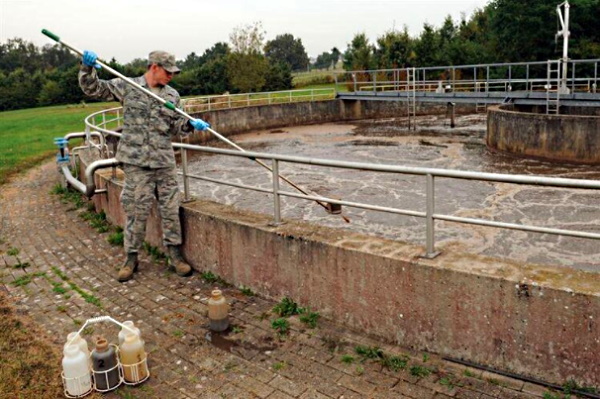
Günther Schneider, a farmer from Binsfeld, Germany, has photos that show what the stream that flows through the village of Binsfeld looks like when aqueous film-forming foam is released from a fire suppression system in hangars on the Spangdahlem Air Base—like a fluffy white ribbon.
All around the meadows, shreds of foam remained like huge snowballs. The toxic substances used in fire-fighting foams on base have contaminated the sewer water, ground water, surface water, and the air, both on and off the base. The foam contains highly toxic per-and polyfluoroalkyl substances, (PFAS).
Throughout the world, the U.S. military has taught soldiers to practice putting out super-hot petroleum-based fires using the deadly foams on military installations.
They dug one-meter-deep craters that were 30 to 60 meters in diameter, and they filled them with jet fuel. They ignited the fuel before extinguishing the flames with the PFAS-laden foams. The toxic “forever chemicals” were allowed to leach into the groundwater and pour into sewer systems, thereby contaminating the environment.
The groundwater monitoring program of the state of Rhineland-Palatinate in the vicinity of the Spangdahlem Air Base found PFAS at concentrations of 1,935 parts per trillion (ppt). The drainage system in Spangdahlem is still spreading the chemicals.
Some U.S. states, like New Jersey, limit two varieties of PFAS found in the poisoned German ground to 14 parts per trillion for Perfluorooctanoic acid (PFOA) and 13 parts per trillion for Perfluorooctanesulfonic acid (PFOS). There are about 8,000 types of PFAS and they are all believed to be dangerous.
The chemicals—in the tiniest amounts—are known to contribute to testicular, liver, breast and kidney cancers, as well as abnormalities in the developing fetus and a host of childhood diseases, ranging from Attention Deficit Hyperactivity Disorder to childhood asthma. Most of the PFAS in our bodies comes from the food we eat, especially fish.
Alexander S. Neu, a member of Die Linke (The Left) in the German Bundestag, along with other Die Linke members of the parliament, have questioned the responsibility for the assumption of environmental damage caused by U.S. troops in Germany.
When the town of Wittlich-Land, close to the sprawling NATO Spangdahlem base, tried to sue the U.S. military for poisoning the town’s sewer system and croplands with PFAS where the contaminated sludge was spread, it discovered it was not allowed to sue the Americans in court.
The poisonous sludge grows poisonous crops. Today, the town incinerates the substances at great environmental and financial cost. The PFAS in the sludge doesn’t burn. Incineration sprinkles tiny toxic particles of PFAS onto homes and fields downwind.
A German brown trout caught in Spanger Bach Creek, near Spangdahlem, was found to contain 82,000 parts per trillion of PFAS. Public health scientists around the world have been warning people not to consume more than 1 ppt of the poisons daily.
Last year, 9,000 kilometers away, a fire suppression system at an aircraft hangar discharged 143,830 liters of the deadly fire-fighting foam from Marine Corps Air Station Futenma in Okinawa. Carcinogenic clouds of foam soared 30 meters into the sky settling on children at a nearby playground.
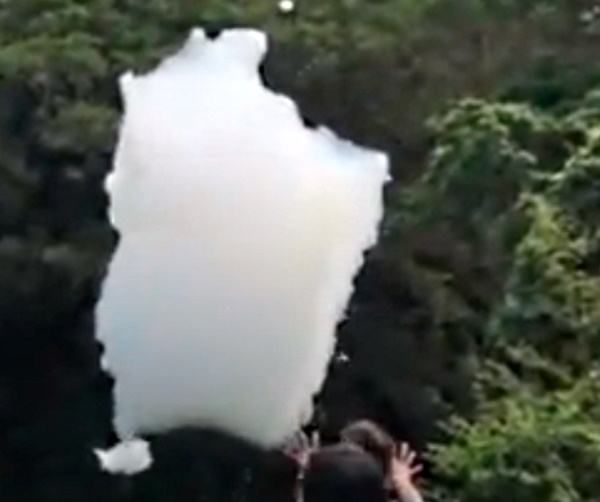
Toshio Takahashia, an Okinawan environmental activist, reported immediately after the incident that frothy foam could be seen pouring from several sewer pipes coming from the Marine Corps base into a a small stream. The deadly bubbles flow to the Hira River through Ginowan City into the East China Sea, poisoning water and fish along the way.
Tomohiro Yara, a representative of the National Diet from Okinawa, reflected the attitude of the Okinawan public when he said, “The U.S. government should take full responsibility for cleaning up soil and water at any military base abroad. We must protect the environment for everyone on the planet.”
Swordtail, pearl danio, guppy, and tilapia caught near the base all contained more than 100,000 ppt of PFAS.
David Steele, Commanding Officer, Marine Corps Air Station Futenma, Okinawa, told the Okinawan people, “When it rains it will subside.” Sadly, these are “forever chemicals” and will poison people and the environment for many generations to come. The Americans accept no responsibility for their criminality because they are not required to do so.
Imperial subjects worldwide need only watch this video of a suppression system at McGhee Tyson Air National Guard Base, in Knoxville, Tennessee, to witness the criminal assault on future generations in that state. One teaspoon of this foam is enough to poison the drinking water reservoir of a large, modern city. See video here.
The U.S. military has known these chemicals are poisonous since the 1970’s. They have contaminated huge swaths of the earth while using them, and they will continue to use them until they are forced to stop. Much of the world has moved beyond the toxic fire-fighting foams and has begun using extraordinarily capable fluorine-free foams while the U.S. military sticks to its killer chemicals.
The American military is not only at war against many of the world’s people, but it is also at war against its own people. It is a war of poisons. Rather than being fought with bombs and bullets it is fought with an arsenal of toxins. The American military is on a mission (we’re still trying to figure out exactly what it is) and everything is subservient to it. Fetal abnormalities, altered DNA, a host of cancers and childhood diseases are no less a threat to humanity than the American missiles hurled from afar to burn human flesh.
Truths conveyed here are largely unmarketable and unpalatable in the United States of America. The American people must learn to seek truth in media that may not include outlets like the New York Times or CNN.
From Germany and Japan to Maryland, 75 Miles South of Washington
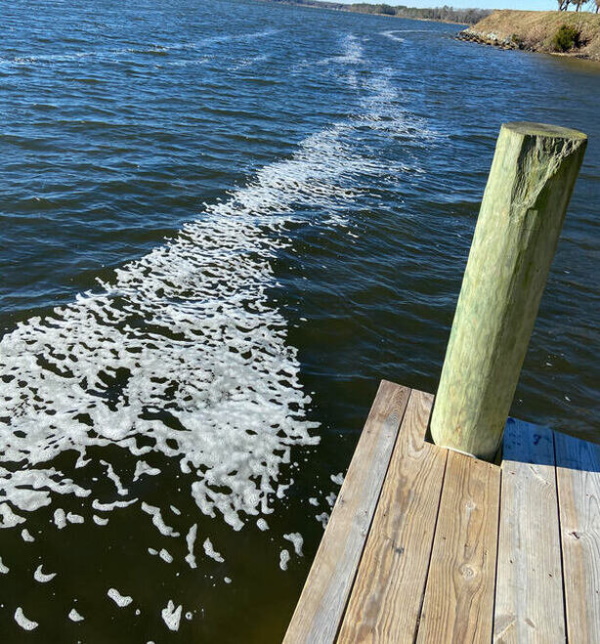
Like Günther, Alexander, Toshio, and Tomohiro, I am also a subject of the American empire. I have no rights or protections from the abuses of the American overlords beyond those of my German and Japanese brethren.
The Patuxent River Naval Air Station in Maryland (Pax River) reported lthat groundwater at Pax River’s Webster Outlying Field contains 84,757 ppt of PFOS. The toxins were detected at Building 8076, also known as Fire Station 3. The level of toxicity is 1,200 times the 70 ppt federal non-mandatory advisory. The groundwater and the surface water from the small naval installation drain into St. Inigoes Creek, a short distance to the Potomac River and the Chesapeake Bay.
I live on the beach 1,800 feet across a deep saltwater creek from the area where PFAS was routinely released into the environment over many years.
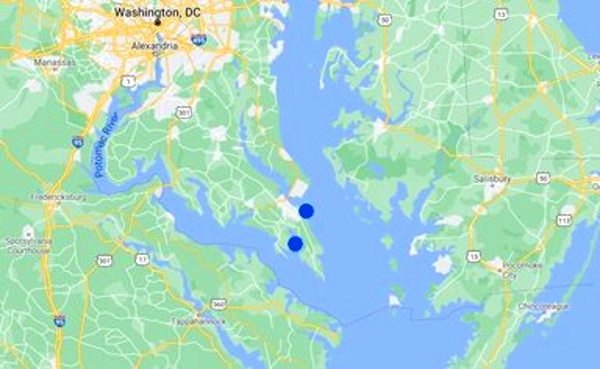
PFAS Contamination at Webster Field
Webster Field occupies the peninsula between St. Inigoes Creek and the St. Mary’s River, a tributary of the Potomac River. The Webster Outlying Field annex is home to the Naval Air Warfare Center Aircraft Division, along with Coast Guard Station St. Inigoes, and a component of the Maryland Army National Guard.
Building 8076 is adjacent to the aqueous film-forming foam (AFFF) Crash Truck Maintenance Area where trucks using foams containing PFAS were regularly tested. The site is less than 200 feet from St. Inigoes Creek, directly across from my family. The practice, according to the Navy, was discontinued in the 1990’s, although the damage continues. The high PFAS levels recently reported are a testament to the staying power of the so-called “forever chemicals.”
Firehouse 3 Webster Field
Highest Readings
- PFOS 84,756.77
- PFOA 2,816.04
- PFBS 4,804.83
In February 2020, I tested the water on my beach on St. Inigoes Creek in St. Mary’s City for PFAS. The results I published shocked the community. The water was shown to contain a total of 1,894.3 ppt of PFAS with 1,544.4 ppt of PFOS. In early March 2020, immediately before the pandemic, 275 people packed into the Lexington Park Library to hear U.S. Navy representatives dismiss their concerns and defend its use of PFAS.
Many were more concerned with the quality of the waters in the creeks and the rivers and the Chesapeake Bay than the drinking water. They had many unanswered questions for the Navy. They were worried about contaminated seafood.
The results I received were generated by the University of Michigan’s Biological Laboratory using EPA method 537.1.
The Navy has only addressed PFOS, PFOA, and PFBS. It fails to address the levels of 11 other types of harmful PFAS found in St. Inigoes Creek: PFHxA, PFHpA, PFHxS, PFNA, PFDA, PFUnA, PFDoA, PFTrDA, PFTA, N-MeFOSAA, NEtFOSAA.
Instead, Patrick Gordon, NAS Patuxent River Public Affairs Officer questioned the “veracity and accuracy” of my results.
This is pretty much a full-court press, and I don’t stand much of a chance while trying to warn the public. The Navy wants to be left alone. The Maryland Department of the Environment doesn’t give a damn, and neither do the St. Mary’s County and State of Maryland Health Departments.
The five conservative Republican County Commissioners are not leading a charge. Senators Ben Cardin (D-MD) and Chris Van Hollen (D-MD) and Representative Steny Hoyer (D-MD 5th District) have been largely silent.
The watermen see a threat to their livelihood. My neighbors say if it were so bad, the authorities would have taken care of it by now.
It’s a lonely, frightening business telling the truth in the land of the free and the brave.
In response to the findings of high levels of the fire-fighting toxins at my beach last year, Ira May, who oversees federal site cleanups for the Maryland Department of the Environment, told the Bay Journal that contamination in the creek, “if it exists,” could have another source. The chemicals are often found in landfills, he noted, as well as in biosolids and at sites where civilian fire departments sprayed foam. “So, there are multiple potential sources,” May said. “We’re just at the beginning of looking at all of those.”
It appears the state’s top environmental official was covering for the military. The nearest firehouse is five miles away, while the closest landfill is 11 miles away. My beach is 1,800 feet from the deadly foam releases.
Fate and Transport of PFAS
It is important to understand the fate and transport of PFAS. The science is not settled. I found 1,544 ppt of PFOS while the Webster Field groundwater on the facility had 84,000 ppt of PFOS.
Our beach sits on a cove north-northeast of the base while the prevailing winds blow from the south-southwest, that is, from the base to our beach. The foams gather with the tide on many days. Sometimes the foam is a foot high and becomes airborne. If the waves are too high the foam dissipates.
Within about one to two hours of high tide, the foams dissolve into water, like dish detergent bubbles left alone in the sink. Sometimes we can see the line of foam begin to form as it hits the shelf of the creek.
For approximately 125 meters the water in front of our house is about 1-1.5 meters deep at low tide. Then, suddenly, it drops to 6-8 meters. That’s where the foams begin to build and move toward the beach. This is 20-30 years after the Navy says they stopped releasing the materials into the ground.
There are other factors to consider regarding the fate and transport of various PFAS in water. For starters, PFOS is the great PFAS swimmer and can travel for miles in groundwater and in surface water. The Germans and the Japanese know a lot about PFOS levels in their rivers near NATO and U.S. bases. They know how poisoned their fish have become.
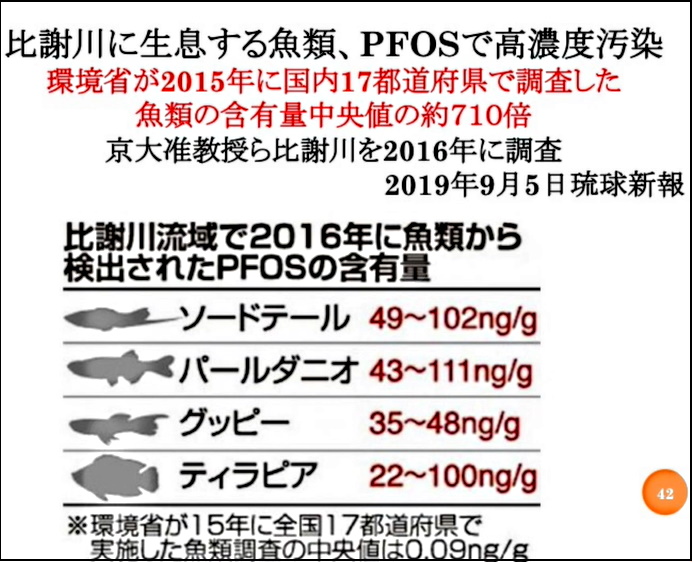
PFOA, on the other hand, seems to be more stationary and tends to contaminate the land, agricultural produce, beef, and poultry. PFOS moves in the water, as is evidenced in the University of Michigan results of the water in St. Inigoes Creek.
After my water results were dismissed by the state, I tested the seafood from the creek for PFAS. Oysters were found to have 2,070 ppt; crabs had 6,650 ppt; and a rockfish was contaminated with 23,100 ppt of the substances. There has been no official response and no mea culpa from the military.
This stuff is poison. The Environmental Working Group says we ought to keep the consumption of these chemicals below 1 ppt daily in our drinking water. More importantly, the European Food Safety Authority says 86% of the PFAS in humans is from the food we consume, especially the seafood.
The state of Michigan tested 2,841 fish for various PFAS chemicals and found the average fish contained 93,000 ppt of PFOS alone. Meanwhile, the state limits drinking water to 16 ppt of PFOS –while people are free to consume fish containing thousands of times more of the toxins.
The 23,100 ppt found in our St. Mary’s City, Maryland, rockfish may seem low compared to the Michigan average, but Webster Field is not a major airbase and cannot service the Navy’s large fighters, like the F-35.
Larger installations typically have higher PFAS levels. A single F-35 may cost more than $100 million and the Pentagon wants to make sure they’re not destroyed in a hangar fire or a training exercise, so they make a judgment that the value of the jet fighter is greater than the value of a baby in the womb.
Although the Naval Command at the Pax River NAS says, “There is no current complete exposure pathway to people from releases of PFAS to on or off base receptors,” they are only considering drinking water sources, and even this claim may be challenged.
Many homes in the predominately African-American Hermanville community, which straddles the west and south sides of the base, are served by well water. The Navy has refused to test these wells, claiming that all of the PFAS from the base runs into the Chesapeake Bay.
The St. Mary’s County (MD) Health Department says it will not test the wells because it trusts the Navy’s findings regarding the toxic plumes of contamination.
Last month the Navy invited “Residents and other interested parties in the vicinity of NAS Patuxent River and Webster Outlying Field” to attend a virtual meeting on PFAS to be held on April 28th.
The way I see it, everyone on the planet is in the vicinity of these two naval installations 75 miles south of Washington. It would be good for people to join such meetings and post comments. They are poisoning our rivers and our oceans. We are one world, subjects of the American empire, whether we live in Germany, Japan or Maryland.
cover image credit: BotMultichillT / Wikimedia Commons